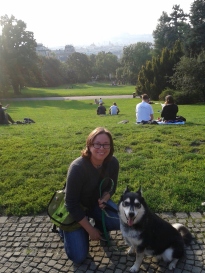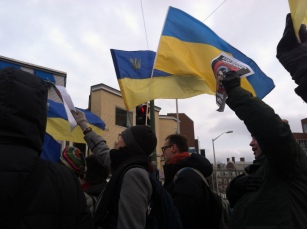I still remember the first tim e I read Mary Daly’s Gyn/Ecology. It awoke something within me. Her use of language, the power of her writing and the ease with which she created new words taught me so much about the world around me and about the way the language, and subsequently its use in writing, shapes lives, choices, abilities and destinies. She also taught me about myself.
e I read Mary Daly’s Gyn/Ecology. It awoke something within me. Her use of language, the power of her writing and the ease with which she created new words taught me so much about the world around me and about the way the language, and subsequently its use in writing, shapes lives, choices, abilities and destinies. She also taught me about myself.
I was hooked, but not just on Mary Daly. Shortly after I finished her book, I moved onto other feminists writing about religion like Katie Cannon, Judith Plaskow, Alice Walker, Carol Christ, Rita Gross, Gloria Anzaldua, Audre Lorde, Adrienne Rich, Margaret Farley and Starhawk to name just a few. All of them, in fact every feminist I’ve ever read, has shown me the way in which words have power and how words speak truth to power. Ever since, I’ve wanted to be the kind of writer whose words carry a power that not only affects people but also inspires a more just, more equal, more compassionate and more humane world. In other words, I wanted to be a writer activist.
Yet, I’ve always carried around with me a sneaky suspicion that people don’t consider writers true activists. If you aren’t holding a sign, screaming or participating in some sort of public demonstration or civil disobedience, then you have no right to call yourself an activist. Is that really true?
A few months ago, I went to what some would call a “real” protest. We stood in the cold waiting for Obama’s Presidential caravan to pass us on his way to a fundraising dinner in Boston. We joined the chorus, of mostly Ukrainians, asking Obama to put sanctions on Russia. That evening he did. I felt successful even though I know that he didn’t change his mind because of me. It felt nice to just get out there, even when shivering was involved. 
Being part of an action to demonstrate against injustice, prejudice, lack of freedom and/or inequality makes a powerful statement to those in places of authority. It shows the people, as a collective of two to thousands, want something different. It is an event that expresses outrage, commitment to a better world and unhappiness in the current system.
Writing is so similar. bell hooks, in remembered rapture: the writer at work, writes, “No black woman writer in this culture can write “too much”. Indeed, no woman writer can write “too much”…When I witness their fear, their silences, I know no woman has ever written enough, (30).” She continues by reminding the reader that feminists have worked long and hard to make women’s writing more valued by society. She laments that we are still far from women’s writing being given the respect it deserves.
hooks believes that women, just by writing, are being activists. We are demanding to be read, to have our words be given the same weight as men and to be heard by a patriarchal society that continues to put its fingers in its ears and sing to itself, ” La la la la.” How much more true is this then in some religious circles which continue to keep women from holding public and/or authoritative roles? I agree with hooks. Not only do I want to write, but hooks said I’m obliged to write.
Sarah Sentilles, another contributor on feminismandreligion.com, wrote for Ms. Magazine’s blog a few months ago arguing that women’s contribution to Wikipedia is a form of activism. She cites the statistic that only 13 percent of contributors to the free encyclopedia are women. Sentilles participated in an edit-a-thon, organized by Art and Feminism Wikipedia Edit-A-Thon to add women artists to Wikipedia which has consistently ignored their inclusion. Here’s another example of the call for women’s writing as activism. Yet the blog takes it one step further. We, as women, are called on to take an active role to record, share and remember our herstory. We cannot afford to let it pass by unknown, undervalued and overlooked. In some ways then because we have the power to write, we must accept that challenge and do so. I agree with Sentilles. Not only do I want to write, but Sentilles says I need to write.
What these two writers show is that feminist writing, in and of itself, is a crucial form of activism. When we write, we say that patriarchy cannot silence us any longer. We educate, expose and inspire. We fill in the gaps within his-story with the equally important herstory. We demand the equality of women and men and the end to prejudice, discrimination, racism, classism, heterosexism and other patriarchal plagues. We find respect and an inner strength. We gain once again that voice which is rightly ours.
 We, religious feminists and feminists interested in religion, also do more. We find not only our human dignity but our dignity as religious persons as well. We inspire spiritual quests and new religious rituals. Some of us work to end sexism and patriarchy in the religious traditions in which we grew up. We show generations of women and men that religion is not only important but that women have an important role to play in it.
We, religious feminists and feminists interested in religion, also do more. We find not only our human dignity but our dignity as religious persons as well. We inspire spiritual quests and new religious rituals. Some of us work to end sexism and patriarchy in the religious traditions in which we grew up. We show generations of women and men that religion is not only important but that women have an important role to play in it.
Writing is every bit as much an activist activity as protests and demonstrations are. As hooks and Sentilles say, not only are we obliged to write, but we need to write as well. Why? Because writing changes the world every bit as much as it changes us.


Words are indeed very powerful. This reminds me of my favorite fragment from Sappho — “Although only breath, words which I command are immortal.”
LikeLike
Right on, write on!
LikeLike
On writing and activism, I was recently reminded of a quote by Simone de Beauvoir where she says: “One is not born, but rather becomes, a woman.” Think deep and that one insight takes you far.
LikeLike
Thanks for writing about writing.
LikeLike
yessss…… !!!
LikeLike
Gulp. Your post so inspiring that I have been guilted into completing the most subversive, revolutionary project that I have ever undertaken: youth fiction.
LikeLike
yesss and words did have so much power in my life, in my earlier years especially when they were breaking silences and questioning traditional agreements about power and justice. which reminds me of Marie’s article on the important role bookstores used to play when they introduced us to books that were on the cutting edge and not only to best sellers. do words have this power today in my life? i would say not, maybe because I have also seen the limitation of visionary words in the face of ever more entrenched power structures.
LikeLike
Ivey —
Your post reminds me of a quote I used many times when I first began to do women’s spirituality workshops and which I used in my latest keynote a week ago. It’s from Monique Wittig’s _Les Guerillieres_. A main character says to her community of women: “There was a time when you were not a slave, remember that. You walked alone, full of laughter, you bathed bare-bellied. You say you have lost recollection of it, remember…You say there are no words to describe this time, you say it does not exist. But remember. Make an effort to remember. Or failing that, invent.” We still need to remind ourselves and other women that we are not slaves, to inspire ourselves and others to reinvent ourselves in all our power. Words can do that. They may not change the power structures immediately, but they can empower us women to work towards that change.
LikeLike
Reblogged this on margythomson and commented:
During women’s studies courses in 1980’s I delved into these authors and what a pleasure. This article reminds me to pick up some of these books again.
LikeLike
Thank you a dozen times over for this post. I’ve been away from the internet for a while, and feel blessed to find your message in the list of topics I haven’t read yet. The timing is fortuitous and I’m grateful. I write compulsively, and I’ve been told that my writing runs from “too simple,” to “too flowery,” from “a mess” to “needs extensive editing.” What do I do? I keep writing, learning, developing my own voice and style. This post and the comments are inspirational and I wholeheartedly agree that writing is activism. I encourage every woman and girl I meet to write *her* story and somehow, whether via blogging or Indie publishing, to get herstory out into the world. I want to read stories of how women feel and journey through life — not just women who are celebrities or experience “major” trauma. Lastly, I love reading books and blogs that write outside the left-brain restrictions imposed upon writers; more about that here: http://kitsnk9s.blogspot.com/2013/04/script.html AGAIN … thank you so much for this post. I intend to save it for future inspiration. :-)
LikeLike
Oh! I forgot to mention that I write primarily so that my nieces and their families in the future will know a little something about how their Aunt perceived the world around her. ;-) Which is how I feel all of us can change the world…
LikeLike
That’s one reason I write as well. Thanks, darl
LikeLike
Reblogged this on CATHOLIC, Non-Roman Western Style and commented:
“Writing is every bit as much an activist activity as protests and demonstrations are. As Hooks and Sentilles say, not only are we obliged to write, but we need to write as well. Why? Because writing changes the world every bit as much as it changes us.”
LikeLike